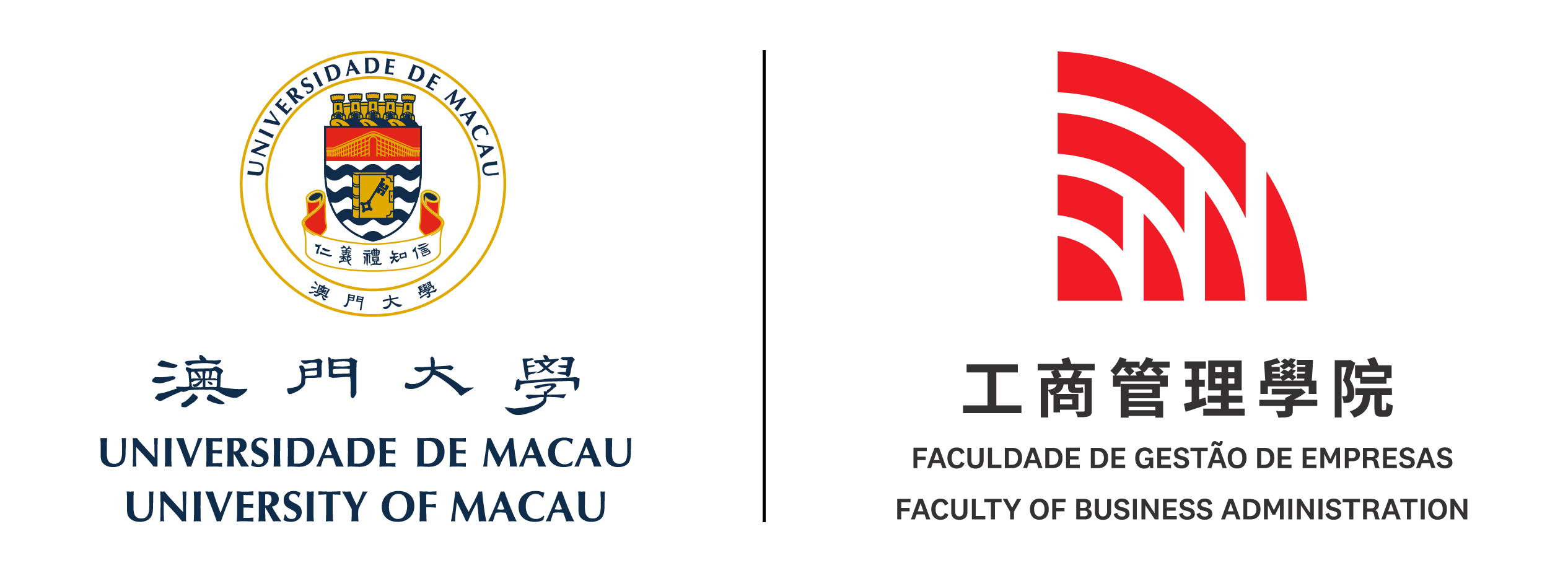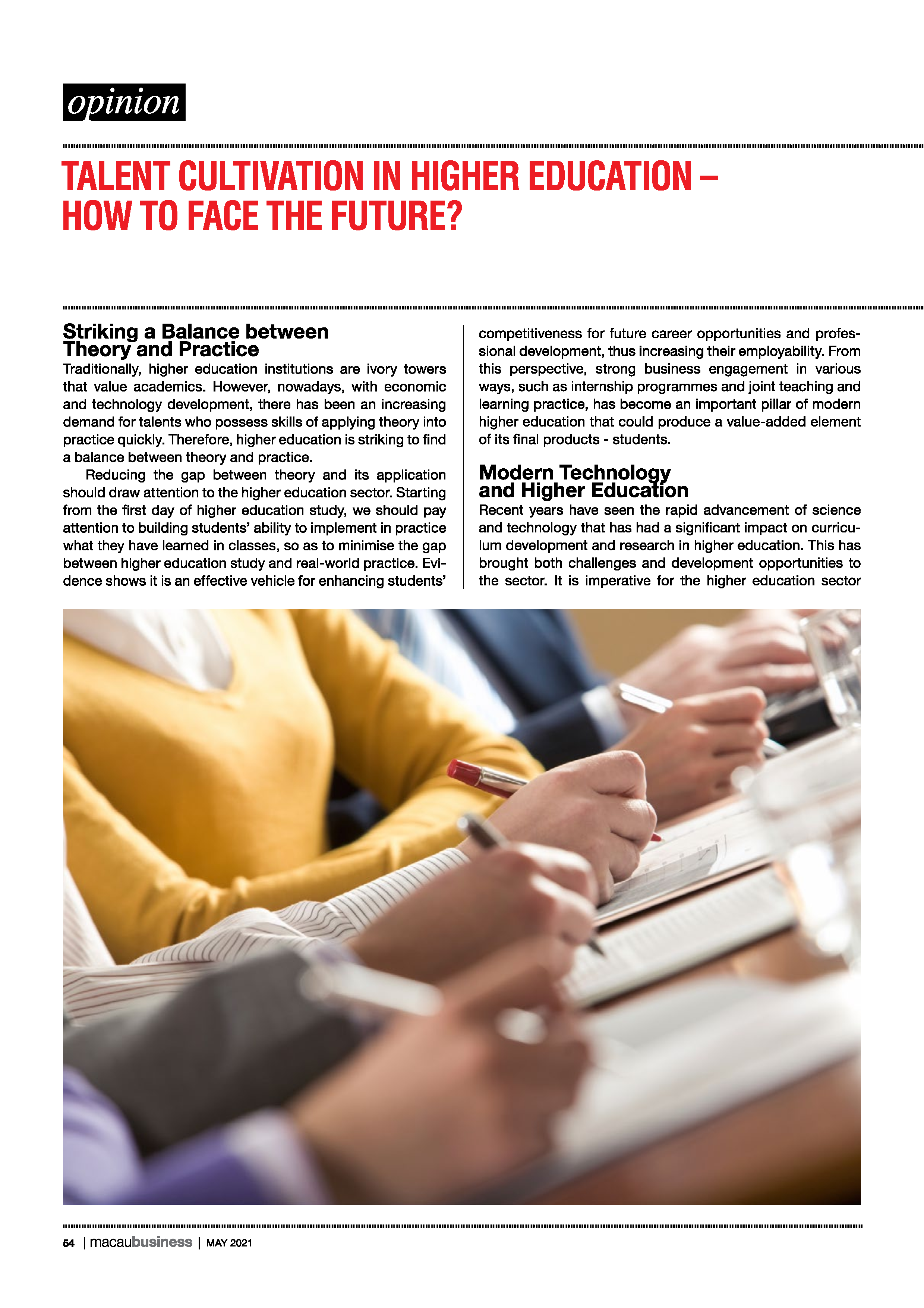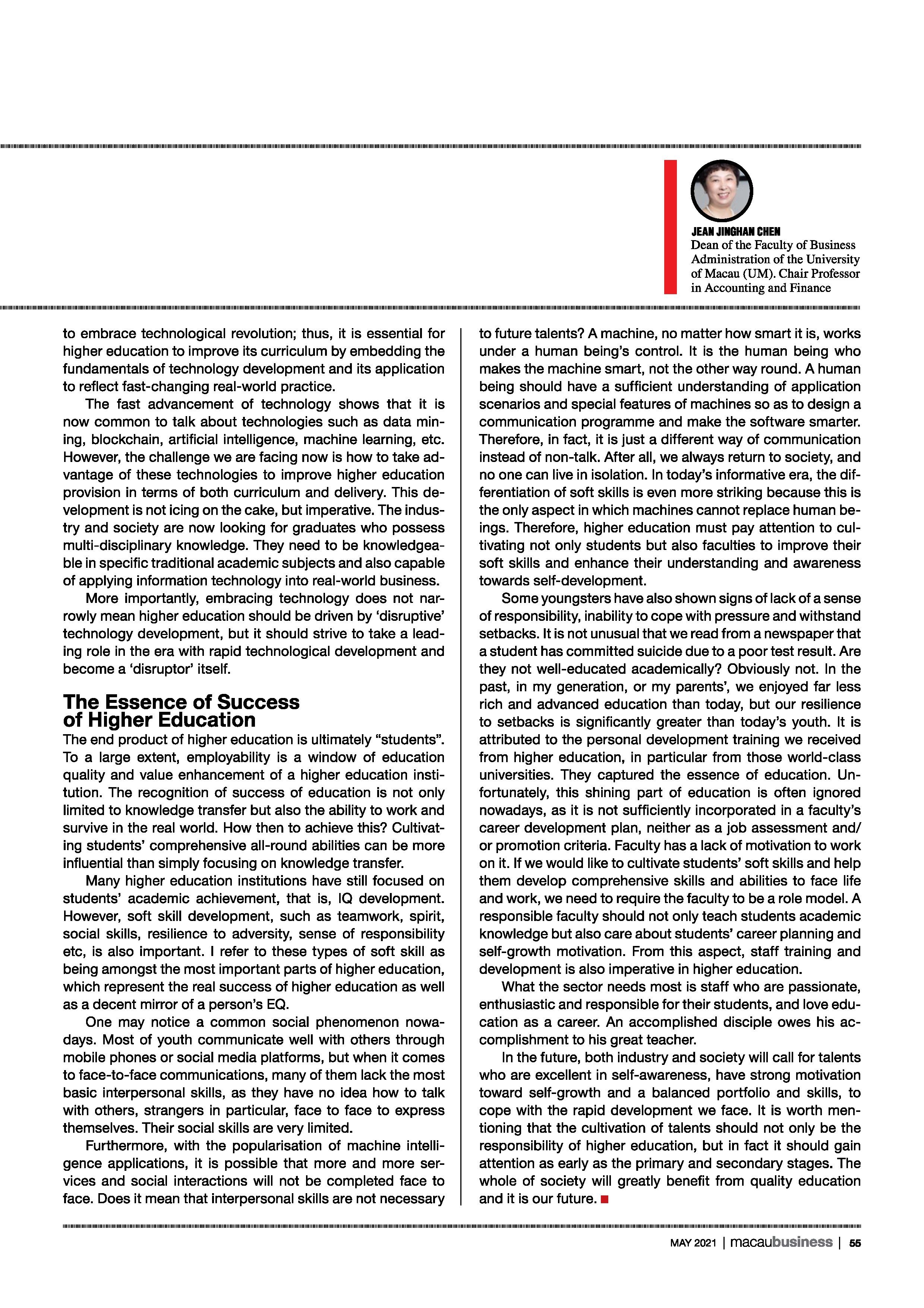Striking a Balance between Theory and Practice
Traditionally, higher education institutions are ivory towers that value academics. However, nowadays, with economic and technology development, there has been an increasing demand for talents who possess skills of applying theory into practice quickly. Therefore, higher education is striking to find a balance between theory and practice.
Reducing the gap between theory and its application should draw attention to the higher education sector. Starting from the first day of higher education study, we should pay attention to building students’ ability to implement in practice what they have learned in classes, so as to minimise the gap between higher education study and real-world practice. Evidence shows it is an effective vehicle for enhancing students’ competitiveness for future career opportunities and professional development, thus increasing their employability. From this perspective, strong business engagement in various ways, such as internship programmes and joint teaching and learning practice, has become an important pillar of modern higher education that could produce a value-added element of its final products – students.
Modern Technology and Higher Education
Recent years have seen the rapid advancement of science and technology that has had a significant impact on curriculum development and research in higher education. This has brought both challenges and development opportunities to the sector. It is imperative for the higher education sector to embrace technological revolution; thus, it is essential for higher education to improve its curriculum by embedding the fundamentals of technology development and its application to reflect fast-changing real-world practice.
The fast advancement of technology shows that it is now common to talk about technologies such as data mining, blockchain, artificial intelligence, machine learning, etc. However, the challenge we are facing now is how to take advantage of these technologies to improve higher education provision in terms of both curriculum and delivery. This development is not icing on the cake, but imperative. The industry and society are now looking for graduates who possess multi-disciplinary knowledge. They need to be knowledgeable in specific traditional academic subjects and also capable of applying information technology into real-world business.
More importantly, embracing technology does not narrowly mean higher education should be driven by ‘disruptive’ technology development, but it should strive to take a leading role in the era with rapid technological development and become a ‘disruptor’ itself.
The Essence of Success of Higher Education
The end product of higher education is ultimately “students”. To a large extent, employability is a window of education quality and value enhancement of a higher education institution. The recognition of success of education is not only limited to knowledge transfer but also the ability to work and survive in the real world. How then to achieve this? Cultivating students’ comprehensive all-round abilities can be more influential than simply focusing on knowledge transfer.
Many higher education institutions have still focused on students’ academic achievement, that is, IQ development. However, soft skill development, such as teamwork, spirit, social skills, resilience to adversity, sense of responsibility etc, is also important. I refer to these types of soft skill as being amongst the most important parts of higher education, which represent the real success of higher education as well as a decent mirror of a person’s EQ.
One may notice a common social phenomenon nowadays. Most of youth communicate well with others through mobile phones or social media platforms, but when it comes to face-to-face communications, many of them lack the most basic interpersonal skills, as they have no idea how to talk with others, strangers in particular, face to face to express themselves. Their social skills are very limited.
Furthermore, with the popularisation of machine intelligence applications, it is possible that more and more services and social interactions will not be completed face to face. Does it mean that interpersonal skills are not necessary to future talents? A machine, no matter how smart it is, works under a human being’s control. It is the human being who makes the machine smart, not the other way round. A human being should have a sufficient understanding of application scenarios and special features of machines so as to design a communication programme and make the software smarter. Therefore, in fact, it is just a different way of communication instead of non-talk. After all, we always return to society, and no one can live in isolation. In today’s informative era, the differentiation of soft skills is even more striking because this is the only aspect in which machines cannot replace human beings. Therefore, higher education must pay attention to cultivating not only students but also faculties to improve their soft skills and enhance their understanding and awareness towards self-development.
Some youngsters have also shown signs of lack of a sense of responsibility, inability to cope with pressure and withstand setbacks. It is not unusual that we read from a newspaper that a student has committed suicide due to a poor test result. Are they not well-educated academically? Obviously not. In the past, in my generation, or my parents’, we enjoyed far less rich and advanced education than today, but our resilience to setbacks is significantly greater than today’s youth. It is attributed to the personal development training we received from higher education, in particular from those world-class universities. They captured the essence of education. Unfortunately, this shining part of education is often ignored nowadays, as it is not sufficiently incorporated in a faculty’s career development plan, neither as a job assessment and/or promotion criteria. Faculty has a lack of motivation to work on it. If we would like to cultivate students’ soft skills and help them develop comprehensive skills and abilities to face life and work, we need to require the faculty to be a role model. A responsible faculty should not only teach students academic knowledge but also care about students’ career planning and self-growth motivation. From this aspect, staff training and development is also imperative in higher education.
What the sector needs most is staff who are passionate, enthusiastic and responsible for their students, and love education as a career. An accomplished disciple owes his accomplishment to his great teacher.
In the future, both industry and society will call for talents who are excellent in self-awareness, have strong motivation toward self-growth and a balanced portfolio and skills, to cope with the rapid development we face. It is worth mentioning that the cultivation of talents should not only be the responsibility of higher education, but in fact it should gain attention as early as the primary and secondary stages. The whole of society will greatly benefit from quality education and it is our future.
Source: https://www.macaubusiness.com/opinion-talent-cultivation-in-higher-education-how-to-face-the-future/



